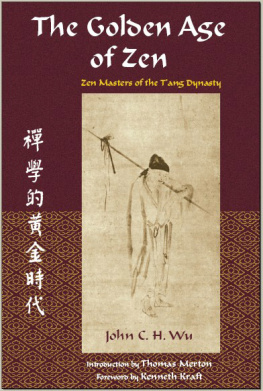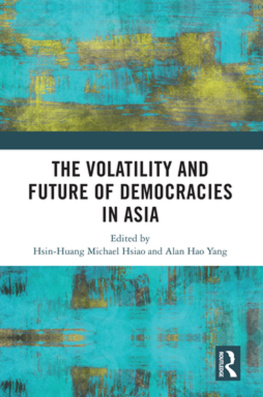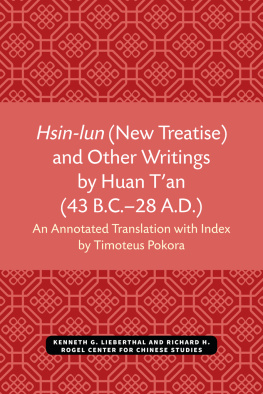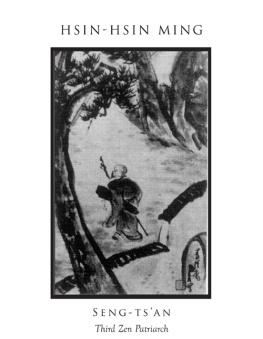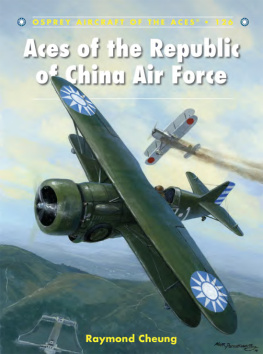Solving Yourself: Yuben de Wu Hsin
Translated b y Roy Melvyn
Solving Yourself: Yuben de Wu Hsin
Translated by Roy Melvyn
Copyright 2013 Roy Melvyn
Summa Iru Publishing
Boulder, Colorado 80020
The point when the words of Wu Hsin are accepted as true and are lived spontaneously and in every aspect of daily life, is the gateway of realization.
Translators Preface
In ancient China, there were certain isolated, mountainous areas in the rural regions that were known as places reserved for intense, secretive trainings. What was taught was believed to be so powerful that it was rumored that there were those who realized their true nature in a single instant.
One such place was the compound of Wu Hsin in Hunan province.
Once a year, on the day following the second full moon, the compound opened its doors for new students. Inside, they gathered to receive what was to be an initial thirty days of instruction. At the end of the thirty days, novices could opt to depart or remain for an additional eleven months.
Wu Hsin's style for this teaching was to speak numerous times during the course of a day, twice at length and other times quite sparingly. Each time was followed by a period of silence. The silence was seen as clearing away any and all conceptual processes in order to facilitate Wu Hsin's direct transmission.
In addition, on arrival, each received a scroll containing the Yuben or Compendium of the Masters Aphorisms, which were 400 contemplatives to be used by the students. At regular times during the day, the students were responsible for making copies of the scroll for themselves and for future students.
A typical day in a student's life began with arising well before dawn, before they can see the lines in the palm of their hand. After their morning toilet duties, they gathered in the main hall where the daily Yuben was read aloud and a period of sunrise contemplation ensued.
Next came breakfast, usually rice with a modest portion of vegetables, and subsequent cleanup. Afterward, each student met individually with Wu Hsin in his quarters, where the student's understanding of the Yuben was examined.
Once dismissed, the students would attend to the garden and grounds of the property. After lunch (the main meal of the day with its leftovers constituting supper) and cleanup, there was more work in the garden, planting and harvesting, as well as repairing the buildings or other maintenance chores. Mid-afternoon, there is a second discourse by Wu Hsin in the garden followed by silent contemplation on said discourse.
The balance of the day was filled by cleaning and upkeep of the interior of the buildings. Then, as nightfall descended, the evening bell rang out to signify the work day's end.
During the evening, the student will spend an hour or more making additional copies of the Yuben. Too, they may sit in contemplation of the daily reading. Finally, late in the evening, they went off to bed.
Solving Yourself: Yuben de Wu Hsin focuses on the transcendence of the body and mind, which results in sudden insight into one's true nature. It produces an involuntary reversion to one's essence, a clear seeing that there is no place that one can call the center or a reference point here. There is nothing substantial that would allow one to declare This is where I begin, this is what I really am.
Wu Hsin's words take their stand outside any scriptures, and are sourced solely from his direct experience and subsequent realization. Its foundation was Li-shih, the interconnectedness of Noumenon and phenomena. He teaches that our true natures are always pure and luminous and that personality is an acquired add-on. Awakening occurs when we pierce through the obscurations that we have created and allow our original purity to shine forth. His words were spoken from the standpoint of the Ultimate, the non-dual reality underlying our everyday unenlightened experience of separation and division.
He assigns no value to volitional activity, yu wei. To awaken, Wu Hsin stresses the spontaneous cessation of thought, no-thought (wu nian), a non-conceptual state of mind that allows one to experience reality directly, as it truly is.
His ideas sketch out a distinctive worldview of dynamic, interactive relationships that unfold in the natural course of things. In this perspective, one can obstruct ones inherent tendencies or open conscientiously into a more free and responsive way of engagement. The latter is the natural way of being. As such, this awakening is the natural result of seeing into this innate but hidden potential and allowing it to manifest in every moment.
He targets the self-conscious sense of separation that tends to arise out of deliberative thinking and living. His focus therein is short on the theoretical. Instead, he advises that one mustn't get distracted with philosophical or speculative thought but instead realize ones true nature in the present moment.
One can see the obvious similarities between this approach and the Daoist notion of wei wu wei and of jnana yoga as outlined in the Bhagavad-Gita.
His unique teaching style makes frequent use of paradoxical statements aimed at jolting students out of their habitual mental processes. He is highly provocative; although he teaches briefly yet it is filled with a concise efficiency.
Those unfamiliar with Wu Hsin will discover a new source of ageless wisdom filled with pointers to one's natural essence.
Over the years, I have used the scroll for reflection on an inscription in the same fashion as was done thousands of years ago. I consider the contents of such value that I have translated them, consolidated the 400 into 366 representing them herein as a daily contemplative to create Solving Yourself . As has been the case with previous Wu Hsin translations, I have taken a bit of license in translating his words into more contemporary expression.
Those who are familiar with Wu Hsin will quickly see the Yuben to be of considerable value. The sayings can act as a stimulant; they are not so much about what Wu Hsin says but about what they evoke and how we respond.
To my way of thinking, what makes the work of Wu Hsin such a pearl of great price is that the articulation of his experience pre-dates, by many hundreds of years, the expressions of the great Channa (Chan) masters of the Tang Dynasty, often considered to be the apogee of Chinese thought.
In that sense, Wu Hsin was the herald of the great insights to come.
Welcoming
The doctor prescribes the taking of herbs for a limited time. During that time, they do their work.
Likewise, our time together will be limited. However, Wu Hsin's words will not be limited. The seeds are planted and will yield fruit.
Wu Hsin's instructions will not lead you to anywhere. They lead you toward the place that you have never departed from. No religion with its requirements of intermediaries and postponement is spoken here. There is no one to wait for and no time need be waited on.
Listen to Wu Hsin and don't listen to your mind. There are two ways of listening: there is the mere hearing of words and there is the listening which catches the real significance of what is being said, the listening that requires a keen, alert mind. To the words of Wu Hsin, hearing is not enough.
It is irrelevant whether or not you agree with what is said. Truth does not require your agreement, merely your recognition.
In the days ahead, there will be opportunities for questions. All the questions that have ever been submitted to Wu Hsin are wrong questions. No one has ever submitted the right question.
The right question is the last question; it leads to the end of questioning. The wrong question merely births more questions.


